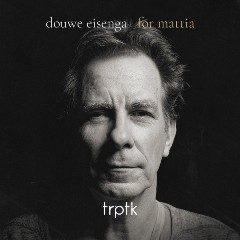Douwe Eisenga – For Mattia (2019)
Douwe Eisenga – For Mattia (2019)

1 For Mattia 7:43 2 Summit 4:19 3 The Opposite 4:25 4 Gentleman 4:02 5 Julia 5:45 6 Pendulum Waves 4:27 7 The Cooper 4:08 8 Carried Away 5:40 Concert Grand Piano – Douwe Eisenga
The music on Douwe Eisenga's For Mattia flows like a ballet dancer's movements. Its nine songs, all solo piano compositions, glitter with a lyricism many vocalists cannot manage. As if Eisenga is playing with light as well as melody. Weaving the two about each other like threads of sound and aether.
This is a record of deep sadness. Mattia, of the title track, was a young woman who committed suicide. Her parents commissioned Eisenga to write this piece—a quiet, simple composition that glides out of the speakers, a breeze shimmering across a sonic plain. Eisenga leaves space between the notes of the melody. So that each one seems to shimmer like stars of sound in the rhythm's galaxy. On following track "Summit," he joins those notes together to form constellations. They trace their outlines over the shifting chords, caught in the heavens as the harmonic world turns below.
Eisenga does not rely on clumsy changes in dynamics to build suspense. Instead he heightens the tension through the harmony; by juxtaposing edged right hand notes against the melancholia of his left hand's broken chords. Or by twisting the rhythms about his fingers, as he does on "The Opposite," where he toys with the beat. Stretching and pulling and releasing it to draw you in. He throws flourishes across the keyboard that spark and sing on "Gentleman." A quicker piece that adds life to the record, keeping it airborne instead of letting it drift down to earth.
Musical composition is the art of making something from nothing. For Mattia's music highlights, through its minimalism, the fineness of the line that separates the void of nothingness from a universe stuffed with wonders. Each one of his notes stands apart from the others, independent and whole like tiny sound-sculptures. But ones that only make sense when placed among the vastness of his left-hand's accompaniment. On the second-last track "Carried Away," he repeats a broken chord beneath the slight dissonance of the melody. While on the closing piece "On The Edge," he uses silences to place the repeated high notes in relation to each other. The effect is beautiful and melancholy, like an old lament.
For Mattia is not a record of gravity. It does not drag the listener in. Rather it holds us captive as if we were gazing on something awesome like a world, but viewed from outside its gravitational pull. So that we can see its every peak and valley and how each becomes the next. Eisenga has crafted a record as spacious as the cosmos. He understands the skill of shaping his music through placing its components against each other. Like chipping lines out of marble, each one must flow into the next, but they also each have to hold up as considered and masterful actions in themselves. While each part of the record does stand on independently, like the lines of a sculpture, together they become a whole greater than the sum of the parts. ---James Fleming, allaboutjazz.com
download (mp3 @320 kbs):
yandex mediafire ulozto gett bayfiles








